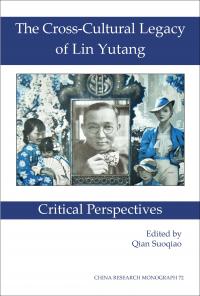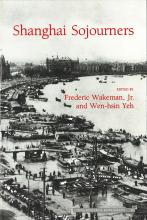The Cross-Cultural Legacy of Lin Yutang
The Cross-Cultural Legacy of Lin Yutang
Qian, Suoqiao, ed.
Lin Yutang (1895–1976) was the modern Chinese writer and intellectual best known to the Western world in the twentieth century. Hailed as a “Chinese philosopher,” Lin was the de facto spokesman for China and Chinese culture and acted as cultural ambassador between China and the United States. This volume, representing the best international scholarship on Lin Yutang studies to date, is a first attempt at a comprehensive study on the cross-cultural legacy of Lin’s literary practices in and across China and America.
As a nonprofit academic press, we need your support to publish our books. Your gift can help us make more of our titles available as e-books. DONATE NOW
Title information
Lin Yutang (1895–1976) was the modern Chinese writer and intellectual best known to the Western world in the twentieth century. Hailed as a “Chinese philosopher,” Lin was the de facto spokesman for China and Chinese culture and played the role of cultural ambassador between China and the United States. This critical volume, representing the best international scholarship on Lin Yutang studies to date, is a first attempt at a comprehensive study on the cross-cultural legacy of Lin’s literary practices in and across China and America. The essays collected here, most of which were first presented at the international conference on the cross-cultural legacy of Lin Yutang in China and America held at the City University of Hong Kong in December 2011, offer different perspectives on Lin’s cross-cultural legacy.
Contributors:
Chen Zishan 陈子善 is professor of Chinese and director of the Center for Modern Chinese Literary Archives and Research at East China Normal University. He is also the editor of Lin Yutang shuhua 林语堂书话 (A collection of Lin Yutang’s essays related to books and reading), as well as the editor of collections of works of many modern Chinese writers.
Chih-ping Chou 周质平 is professor of East Asian studies at Princeton University and specializes in modern Chinese intellectual history and late-Ming literature. His publications include A Pragmatist and His Free Spirit: The Half-Century Romance of Hu Shi and Edith Clifford Williams (co-authored with Susan Chan Egan, Chinese University of Hong Kong Press, 2009) and Xiandai renwu yu wenhua fansi 现代人物与文化反思 (Modern Chinese intellectuals and their cultural reflections; Beijing: Jiuzhou Press, 2013).
Rivi Handler-Spitz is assistant professor of Chinese at Macalester College in St. Paul, Minnesota. Her forthcoming book, A Book to Burn and a Book to Keep (Hidden), coedited with Pauline Lee and Haun Saussy (Columbia University Press, 2016), marks the first large-scale translation of essays by the late-Ming radical intellectual Li Zhi into any Western language.
Charles W. Hayford is a historian of modern China. Since taking his Ph.D. in history and East Asian languages from Harvard in 1973, his interests have run to cultural relations across the Pacific. His publications include “Open Recipes, Openly Arrived At: How to Cook and Eat in Chinese (1945) and the Translation of Chinese Food,” Journal of Oriental Studies 45, nos. 1 and 2 (2012) and “Who’s Afraid of Chop Suey?,” Education about Asia 16, no. 3 (2011).
Charles Laughlin is currently Weedon Chair Professor of East Asian Studies at the University of Virginia. He has published extensively on Chinese literature from the 1920s to the 1960s, including two books: Chinese Reportage: The Aesthetics of Historical Experience (Raleigh, NC: Duke University Press, 2002), and The Literature of Leisure and Chinese Modernity (University of Hawai’i Press, 2008).
Fang Lu 吕芳 is currently an assistant professor of practice at the Department of Slavic and Eastern Languages and Literatures at Boston College. Her publications include research articles, translations, and edited books, such as “The Afterlife of Six Chapters of a Floating Life: Three English Translations of Fu sheng liu ji” in Translation Review (2010), and “Translation, Manipulation and the Transfer of Negative Cultural Images—A.C. Safford’s Typical Women of China” in The Translator (2009).
Peng Chunling 彭春凌 is associate professor at the Institute of Modern History, Chinese Academy of Social Sciences, Beijing. Her publications include the monograph Ruxue zhuanxing yu wenhua xinming: Yi Kang Youwei, Zhang Taiyan wei zhongxin, 1898–1927 儒学转型与文化新命: 以康有为,章太炎为中心, 1898–1927 (The transformation of Confucianism and the New Culture Movement: Focusing on Kang Youwei and Zhang Taiyan, 1898–1927; Peking University Press, 2014).
Qian Suoqiao 钱锁桥 is professor (chair) of Chinese studies at Newcastle University, UK. He is the author of Liberal Cosmopolitan: Lin Yutang and Middling Chinese Modernity (2011). He has just finished a monograph tentatively titled Lin Yutang: Journey across China and America, 1895–1976.
Joe Sample is an associate professor in the Department of English at the University of Houston-Downtown (USA). He recently completed a monograph titled Writing Chinese: Lessons in the Rhetoric of Representation, in which he identifies shared images, figures of speech, and characteristic lines of argument across times and genres in English-language representations of China and the Chinese.
Diran John Sohigian is an associate professor in the Department of Applied English in the College of Creativity and Culture at Shih Chien University Kaohsiung Campus, Taiwan. In 1991 he received his Ph.D. in Chinese language and literature from Columbia University with a dissertation on “The Life and Times of Lin Yutang.” His most recent publication is “The Phantom of the Clock: Laughter and the Time of Life in the Writings of Qian Zhongshu and His Contemporaries” in Jessica Milner Davis and Jocelyn Chey, eds., Humour in Chinese Life and Culture: Resistance and Control in Modern Times (Hong Kong University Press, 2013).
Richard Sheung 商承禹 is assistant professor in the Department of Chinese, Translation and Linguistics at City University of Hong Kong. His research interests are in writings of colonial Hong Kong, colonial modernity, translation and bilingualism, and translation as cultural critique. He has published in the American Journal of Semiotics, Babel, and Renditions.
Wang Lu 王璐 is a Ph.D. candidate at Newcastle University, UK. Her Ph.D. dissertation is tentatively titled “West Wind: Being Modern and Chinese through Translation,” a study of the translation magazine Xifeng 西风 (West wind) in Republican China.
Yang Liu 杨柳 received her doctoral degree in religious studies from the Chinese University of Hong Kong. She specializes in the interdisciplinary study of religion and literature and the history of Christianity in China. Her dissertation is on Lin Yutang’s relationship to Christianity. Her recent publications include “Lin Yutang: Astride the Cultures of East and West,” in Carol Lee Hamrin and Stacey Bieler, eds., Salt and Light: Lives of Faith that Shaped Modern China, vol. 3 (Eugene, OR: Pickwick Publications, June 2011).
Qian, Suoqiao, ed.
Qian Suoqiao 錢鎖橋 (also Qian Jun 錢俊) is professor and chair of Chinese studies at Newcastle University, UK. He is the author of Liberal Cosmopolitan: Lin Yutang and Middling Chinese Modernity (2011) and editor of Cross-Cultural Studies: China and the World (2015), Little Critic: The Bilingual Essays of Lin Yutang (2012), and Chinese American Literature: An Annotated Bilingual Bibliography (2011), in addition to other publications. He has just finished a monograph tentatively titled Lin Yutang: Journey across China and America, 1895–1976.
B.A. in English, Beijing Foreign Studies University; M.A./Ph.D. in comparative literature, University of California, Berkeley
The Cross-Cultural Legacy of Lin Yutang: Critical Perspectives (CRM 72)
Contributors – vii
Introduction. Western Universalism and Chinese Identity: Lin Yutang as a Cross-Cultural Critic – 1
Qian Suoqiao
PART I. TRADITION AND RELIGION: AN ALTERNATIVE INTELLECTUAL PATH
1. On Lin Yutang: Between Revolution and Nostalgia – 19 Chih-ping Chou
2. Lin Yutang’s Unique Adoption of Tradition – 38 Charles Laughlin
3. A Bundle of Contradictions: Lin Yutang’s Relationship to Christianity – 49 Yang Liu
PART II. LANGUAGE AND LAW: CULTURE AND POLITICS IN THE 1920s AND 1930s
4. Lin Yutang and the National Language Movement in Modern China – 67 Peng Chunling (translated by Wang Lu and Fang Lu)
5. The “Fair Society” (Pingshe) in the Diaries of Lin Yutang and Hu Shi – 95 Chen Zishan (translated by Richard Sheung)
PART III. CROSS-CULTURAL TRAVELS BETWEEN CHINA AND THE WEST
6. Lin Yutang’s Criticism of Criticism of Criticism: On Self-Expression in China and America – 115 Diran John Sohigian
7. Collaborator or Cannibal? Montaigne’s Role in Lin Yutang’s Importance of Living – 143 Rivi Handler-Spitz
8. The Genesis and Reception of My Country and My People – 162 Qian Suoqiao
PART IV. INTERPRETING CHINA AND CHINESE IN AMERICA
9. His Country and His Language: Lin Yutang and the Interpretation of Things Chinese – 185 Joe Sample
10. Reconstructing the Image of a Chinese Courtesan for Western Readers: Lin Yutang’s Miss Tu and His Cross-Cultural Rewriting Strategies – 201 Fang Lu
11. The Several Worlds of Lin Yutang’s Gastronomy – 232 Charles W. Hayford
Index – 253
|
JOURNAL REVIEWS |
|
“The editor and contributors of the volume are to be lauded for presenting diverse aspects but centered on the unifying theme of Lin Yutang and his writings. Particularly praiseworthy is the lack of repetition in the chapters, a common downfall of many edited volumes on historical figures. [...] Lin Yutang’s background and writings deserve closer attention from scholars today and this volume is one step in that direction.” ~Chris White, Purdue University, in Journal of Chinese Overseas, Volume 14: Issue 1. (https://brill.com/view/journals/jco/14/1/article-p147_11.xml) |


